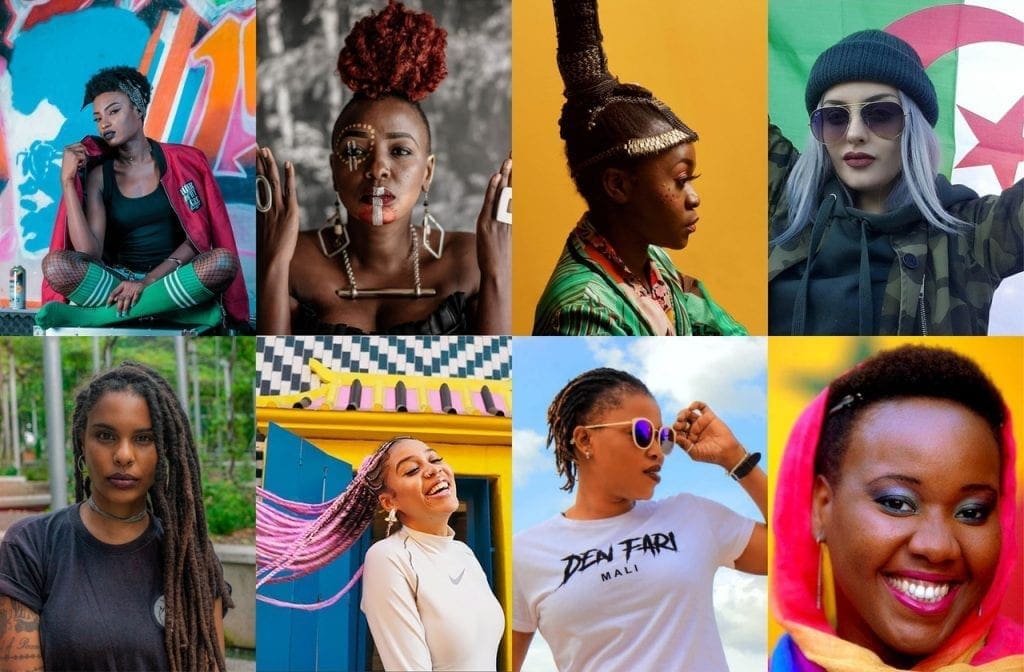Are female rappers Africa’s new griots in 2020? One thing is certain, African hip-hop is standing tall as these women offer modern takes that are uninhibited, in step with the times and uncompromising.
Rap to live
Thanks to the pioneers who broke through in the late 90s – such as ALIF in Senegal or Zara Moussa in Niger – being a female African rapper is no longer classed as a miracle in 2020. Not that anybody has tried to claim that it’s easy, especially not Ami Yerewolo.
“When I started rapping, everyone wanted to stop me: my family, society, even other rappers! In Mali, like everywhere else, women were only supposed to get married, submit or be marginalised if they refused to obey. Today, I’ve released two albums, filled the Palais de la Culture in Bamako and don’t depend on anyone, so it’s turned out okay!” Without a doubt, Ami Yerewolo has got a taste for independence and didn’t wait to be taken seriously before breaking free of the music industry’s “rotten men”. By founding Denfari Events, the winner of the “Femme Battante du Mali” [Mali’s Warrior Woman] award in 2016 gave herself a way to distribute her music, be free to organise her own concerts and launch a festival, Le Mali a des Rappeuses [Mali Has Female Rappers], a springboard and solidarity network for her “community of sisters”.
There is strength in unity, an adage that has proven itself and the Amazons of African hip-hop have made it a weapon to help carve out their place in the rap game. “When you’re a woman in hip-hop, you have to grab the microphone because they’ll never give it to you” comes the cutting response from Moonaya, a female rapper from the Senegalese collective Free Voices, formed on the occasion of the 30th anniversary of Hip-Hop Galsen – a pioneer in Africa, almost as old as French rap. “What’s our reason for existing? Showing it can be done”, she adds.
Rap with a consience
Plenty of them have got the message it seems: women have taken back rap to shut up the phallocrats! And their male counterparts have got the message too, such as Yeli Fuzzo in Mali and Awadi in Senegal, who openly support them. “Don’t talk to me about gender, talk to me about talent”, says Ivorian MC Andy S in his latest mixtape Le rap n’a pas de sex.
Denouncing the inequalities of patriarchal societies, violence against women, sexism, the ravages of rape and female genital mutilation… This is the credo behind the lyrics of feminist hip-hop that goes by the name of Keyla K in Guinea, Dama Do Bling in Mozambique, Soultana in Morocco, Muthoni Drummer Queen in Kenya, Myam Mahmoud in Egypt, Asayel Slay in Saudi Arabia – threatened with imprisonment by the authorities – and Sister Fa in Senegal. For the latter, hip-hop is a “powerful vehicle for awareness, especially among young people and in remote regions because all you have to do is press play”. In Senegal, hip-hop has already shown its strength with the Y’en A Marre [Fed Up] movement that played a large part in the fall of President Wade in 2012.
If hip-hop is essentially an act of protest, in Africa it offers close support to the continent’s struggles, movements for change and major revolutions, when it’s not provoking them. In 2017, for example, when Muthoni Drummer Queen posted “Kenyan Message” on YouTube, did she suspect it would go viral through Bluetooth and WhatsApp, only to reappear on public transport and become the anthem for the Kenyan doctors’ strike? In Madagascar, the young slammer Caylah denounces the stigma of French colonisation and the corruption of the “Malgaches en costard” in vitriolic lyrics, while in Algeria, Raja Meziane pulls no punches in “Allô le système”, a fiercely polemical take with 43 million views adopted as a chorus across the country when it hit the streets in the spring of 2019.
Pride
At a time when young African women are no longer ashamed of being proud, rap naturally comes into play as a space for reflection and reclaiming issues of identity.
In “Qui”, the female Senegalese rapper Moonaya samples the famous speech by Malcolm X – “Who taught you to hate yourself?” – in an ode to the beauty of the black body, while in Mali, Ami Yerewolo raps in Bambara over productions that combine urban beats and traditional instruments because “it’s not by imitating the Americans or the French that I’m going to make a name for myself: I’m Malian and proud”. To its own beat, African rap also bears witness to the need to produce a new discourse around gender and sexuality. And if the gentlemen are still lagging behind, the radicalism of female rappers such as the ex-drag-king Dope Saint Jude has contributed to the emergence of a queer scene in South Africa in particular, followed by Nyota Parker, Nazlee Saif Arbee, the transgender artist Umlilo and the duo FAKA.
Finally, with the democratisation of the web and new technologies on the continent, it’s not impossible to see African hip-hop changing, and quickly: software hacked through Wi-Fi and DIY learning, digital experiments and electronic blends in the music of Sho Madjozi for example, who marries his Tsonga rap with the fury of gqom beats. And it has big ambitions, judging by posters for all the leading festivals, in Africa and beyond. Of course, many female artists dream of exporting their music, not least because of the lack of dedicated structures in Africa, but others are going the opposite way, like Sampa The Great, a Zambian rapper based in Australia who celebrates her roots on The Return and Lous and The Yakuzas who nurtures the hope of being able to return to the Congo, from her adoptive Belgium, to build hospitals there.
A vector for emancipation, solidarity, empowerment and creativity, African hip-hop really does have everything going for it, especially when women are involved!


